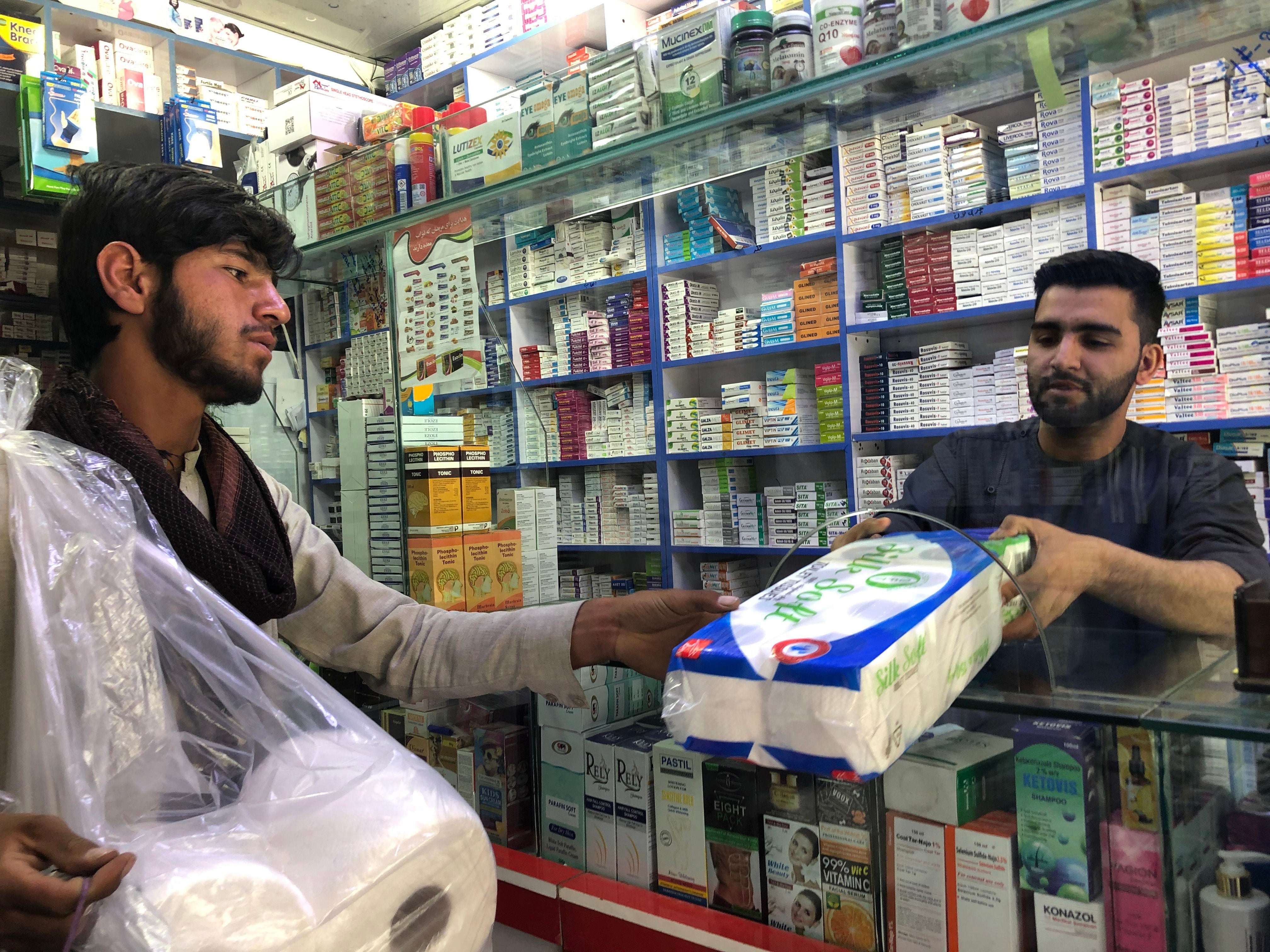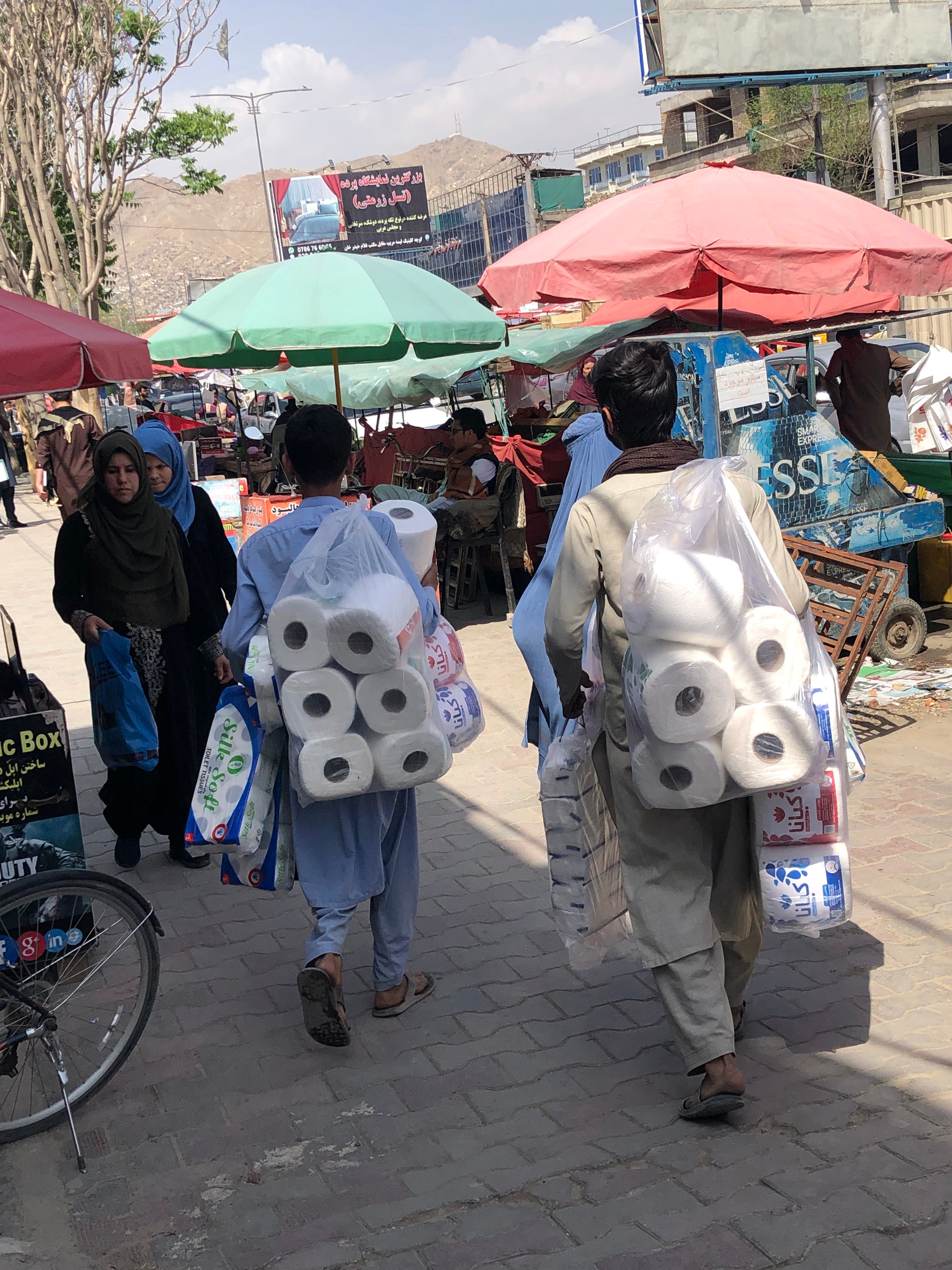In Afghanistan, boys are becoming the breadwinners
In Kabul, war and poverty have long created a permanent underclass of child beggars, scavengers and shoeshine boys, but their numbers have soared in recent months, reports Pamela Constable

Your support helps us to tell the story
From reproductive rights to climate change to Big Tech, The Independent is on the ground when the story is developing. Whether it's investigating the financials of Elon Musk's pro-Trump PAC or producing our latest documentary, 'The A Word', which shines a light on the American women fighting for reproductive rights, we know how important it is to parse out the facts from the messaging.
At such a critical moment in US history, we need reporters on the ground. Your donation allows us to keep sending journalists to speak to both sides of the story.
The Independent is trusted by Americans across the entire political spectrum. And unlike many other quality news outlets, we choose not to lock Americans out of our reporting and analysis with paywalls. We believe quality journalism should be available to everyone, paid for by those who can afford it.
Your support makes all the difference.Nine months ago, Karzai Balochkhel was a tenth-grade student, learning maths, physics, and even a bit of art history. Today, he is an itinerant pedlar, selling paper towels door to door and learning how to haggle over pennies. On a good day he can make about $4 (£3.14), just enough for his family to eat that night.
At 16, Karzai is among thousands of students who have had to drop out of school or cut classes to work since the Taliban takeover in August. With almost no foreign aid entering the country, and many adults jobless, more and more school-age boys have become breadwinners for their families.
In Kabul, war and poverty have long created a permanent underclass of child beggars, scavengers and shoeshine boys, but their numbers have soared in recent months. Today, boys of all sizes roam the streets of the capital, toiling in markets and garages and rubbish dumps.
While the Taliban government has provoked international outrage by banning girls from secondary school, it has encouraged boys to get an education. Aziz-ur-Rahman Rayan, the education ministry spokesperson, has said that 6 million boys are currently in school, as well as 2.7 million girls, although The Washington Post could not verify those figures.
In Kabul, some boys attend school in the mornings, then work in the afternoons. At a non-profit programme called Aschiana, more than 1,500 working boys take morning classes and eat lunch before they hit the streets. Yousef Nawabi, the long-time director, says the need has rocketed in recent months.
“The rich have left, the somewhat poor have become more poor, and the very poor are desperate,” Nawabi says. During the past two decades, he notes, international funds poured in for social programmes, many focused on children. “Now that has all stopped.”
For boys like Karzai – who grew up in an era of rapid modernisation and rising expectations for Afghan youth, with new schools being built across the country and private universities flourishing – being forced into menial work has been especially hard. His younger brother Shahid, 14, has also had to leave school, and accompanies him on his daily rounds.
After supper, Karzai says, he sometimes leafs through his old schoolbooks – partly to fend off feeling depressed, partly to see if he can retain some of his lessons
“I am trying to keep my brain alive, but every day I carry a stone on my shoulder,” Karzai says.
One day in April, the brothers head into the city early, sharing a taxi for 10 cents. They stop at a supplier, where they pick up plastic sacks of kitchen roll and toilet paper on credit, then plot their route. First they hit a busy market in middle-class Khair Khana, holding up their wares at the doorways of mobile phone dealers, beauty parlours and appliance shops. Not once are they invited inside.
As they thread their way among crowds of shoppers and beggars, they repeatedly encounter potential customers who look well dressed but say their asking price of around $1.10 per roll is too high, even when they offer to accept less.
Along the way, Karzai passes several restaurants where he once made regular sales. Now they are all closed for the month of Ramadan, which also requires the brothers to walk all day without eating or drinking. “It’s hot, and it’s especially hard on my brother,” he says.
Next they try a block of brightly lit jewellery emporiums, but a guard shoos them away. Finally, a man changing money at a pavement stall says he will buy a roll of toilet paper. The brothers exchange quick smiles. The man, 35-year-old Najib Bashir, asks about their situation, then laughs ruefully and switches to English.
“I’m in the same position they are,” he says. Before the Taliban takeover, Bashir worked as a security coordinator for the World Bank. But the bank shut down its office in Kabul and he was left jobless, with a wife and four children, hoping in vain for a foreign visa. Now, he makes little more than $4 a day. “It’s not enough, but what choice do I have?” he says.

The brothers decide to try another neighbourhood where there are several hospitals and chemists’ shops. Karzai says pharmacists often need paper towels, but on this day only one, Murtaza Khaleqe, asks for a roll, frowning at the price. Since the change of government, his business has fallen by 70 per cent. “People get prescriptions, but they can’t afford to fill them,” he says.
Half an hour later, the brothers spot another boy coming towards them carrying identical plastic sacks of paper towels over his shoulder. They exchange greetings, but it is an awkward moment. “Everyone’s getting into this business now,” Karzai says with a sigh.
After about four hours of walking, they decide to call it quits. Their total take is 400 Afghanis, about $4, minus the commission they have to return to the supplier. Asked why they don’t try to sell their products nearer to home, Karzai shakes his head firmly. “Nobody in our area uses paper,” he says. “That’s only for rich people.”
Shahid, who has a headache from walking in the sun, says there is another reason. “People there laugh at us and call us bad names,” he says. “But we have to keep going. If we come home with some money for food, our parents are happy. If we don’t, they are upset. That’s the only thing we think about all day.”

The Balochkhel family home is a small rented house in Pul-e-Charki, a district of dirt streets and crowded markets in eastern Kabul. The front door looks out on a stony vacant lot. The rooms are mostly empty, the walls bare.
The boys’ father, Yusuf, was once a police officer, taking home more than $200 per month. But he lost his job when the Taliban took over, like thousands of other government workers, and has been unable to find work since. Their two older brothers fled to Pakistan, where one washes cars and the other sews tunics.
The family is almost totally dependent on Karzai and Shahid, whose earnings are not enough to pay the rent and often not enough to buy more than rice and lentils for dinner. The decision to pull them out of school was a last, desperate resort.
“You cannot know the sadness that has stayed in my heart because I had to take them away from their studies,” says Yusuf, 45, wringing his hands in distress as he sits in his front room. Ten years ago, he moved his family from their ancestral village to the capital, just so his younger sons could get an education.
“We had enough to live on. The boys were doing well in school. We had no worries,” he says. “Then, in just one day, we lost everything.”
After supper, Karzai says, he sometimes leafs through his old schoolbooks – partly to fend off feeling depressed, partly to see if he can retain some of his lessons. This evening, he can’t find his physics textbook, so he brings out his Pashto language workbook. One section is about European art, illustrated with copies of paintings by Rembrandt, Jean-Francois Millet and Leonardo da Vinci.
“I like looking at these things, but it makes me sadder,” he says. “Maybe it’s better if I don’t try to remember at all.”
© The Washington Post




Join our commenting forum
Join thought-provoking conversations, follow other Independent readers and see their replies
Comments